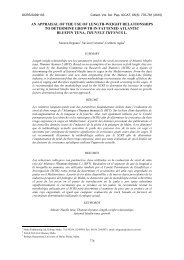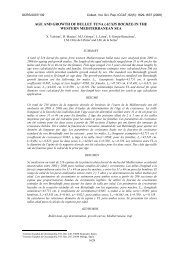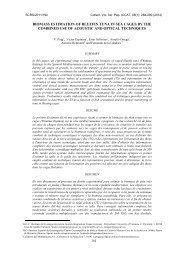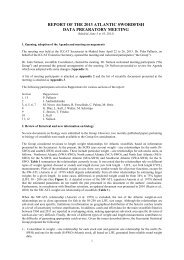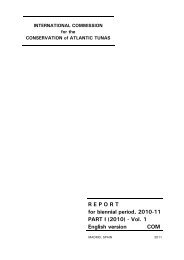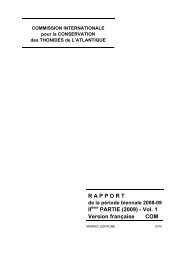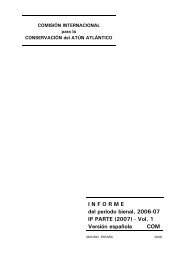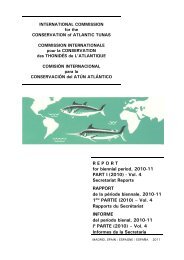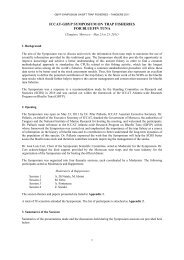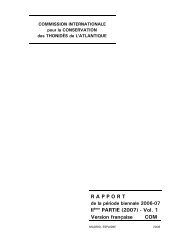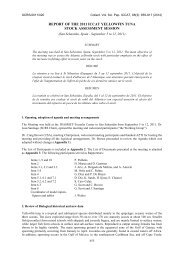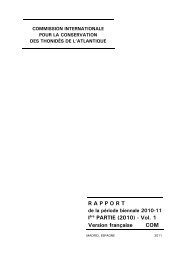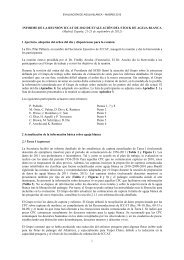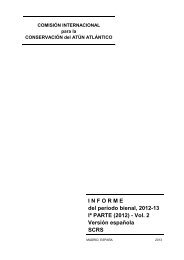E - Iccat
E - Iccat
E - Iccat
Create successful ePaper yourself
Turn your PDF publications into a flip-book with our unique Google optimized e-Paper software.
ICCAT REPORT 2002-2003 (II)<br />
Swordfish and billfish recovery plans: In a letter dated 21 July 2003, the CARICOM State of Grenada provided<br />
the Commission Chairman with an update of that country’s continuing contributions to the ICCAT swordfish<br />
recovery plan. These contributions have been very successful in limiting swordfish catches. In addition, Grenada<br />
advised the Commission Chairman of the resumption of biological sampling of billfish catches. CARICOM is<br />
pleased with this positive development in view of the importance of billfish fisheries in Grenada. Grenada’s<br />
longline fishery is largely artisanal in nature (mostly wooden boats with manually operated longline reels). In<br />
view of this, the catch reductions recommended under the present rebuilding plan for blue marlin and white<br />
marlin should not apply to Grenada, but only to large-scale mechanized longline and purse seine fishing<br />
operations. In its letter of 21 July 2003, Grenada has sought formal clarification of this matter. If the current<br />
recommendation makes no distinction between the two types of fisheries, CARICOM asks that the<br />
recommendation be amended to include this distinction, specifically in terms of taking into account the special<br />
interests of developing States and avoidance of a disproportionate burden of conservation action on small,<br />
developing States. This request is entirely fair and in accordance with international law.<br />
General management issues: The issue of the application of the blue marlin and white marlin rebuilding plan to<br />
Grenada draws attention to a general need for texts of ICCAT management recommendations and resolutions to<br />
include clauses that differentiate properly between the conservation actions required of developed and<br />
developing States, and between developed and developing fisheries.<br />
For example, the Commission’s catch quota recommendations should accommodate those catches taken by<br />
artisanal and small-scale fisheries. These fisheries often prove the only source of protein to local coastal<br />
communities. Artisanal fisheries are complex in nature and distribution, and it is widely accepted that they<br />
cannot be adequately sampled. Ignoring their existence and impact on Atlantic tuna resources just because the<br />
countries are not members of ICCAT would appear to be injudicious, especially if ICCAT´s responsibility<br />
covers the overall conservation of Atlantic tuna and tuna-like resources, and is not restricted to conserving catch<br />
quotas for ICCAT Contracting Parties.<br />
In the case of minimum size regulations and tolerance limits, ICCAT needs to consider the restricted range in<br />
which artisanal and small-scale fisheries operate. In the CARICOM region, these fisheries are usually limited to<br />
coastal waters, where the harvest of certain amounts of juvenile fish is unavoidable. Considering the limited<br />
capacity of artisanal and small-scale fishers within the CARICOM region to change their traditional fishing areas<br />
and methods, and recognizing the essential role they play in ensuring food security of the countries concerned,<br />
ICCAT minimum size regulations should accommodate for higher tolerance levels in these fisheries. In contrast,<br />
minimum size regulations and associated catch tolerance levels should be stricter in the large-scale fisheries that<br />
operate further offshore, and which do not have the capacity to modify their fishing areas and methods.<br />
The implementation of stock rebuilding programs should consider compromises that are practical and take into<br />
account developmental difference among States. In the case of developed fisheries that are already operating at<br />
full capacity, rebuilding actions requires catch quota reductions. In contrast, developing fisheries, particularly<br />
those in developing States, should be requested only to limit their fishing effort and catches to present levels.<br />
Imposing catch quota reductions on developing fisheries doubles the burden of conservation action required: the<br />
countries concerned suffer (i) economic losses in the same way as those with developed fisheries, as well as (ii) a<br />
halt on economic development. This is inequitable, especially where developing States are involved, and in view<br />
of the fact that the stock declines are really the result of excessive harvesting activities by the developed<br />
fisheries.<br />
These comments merit careful consideration by the Commission, and I thank you for your time and attention.<br />
Forum Fisheries Agency (FFA)<br />
The observer mission of the South Pacific Forum Fisheries Agency sincerely appreciates the invitation from the<br />
Chairman, on behalf of the Members, to attend this meeting. Our attendance at this meeting provides a welcome<br />
opportunity for us to observe first-hand how you deal with issues that are of great interest to FFA members, and<br />
to meet with you informally to discuss matters of mutual interest.<br />
Our observer mission comprises Mr. Sautia Maluofenua, Director of Fisheries for the Government of Tuvalu,<br />
and Mr. John Atwood, the Legal Counsel based at the Agency’s Secretariat in Honiara, Solomon Islands.<br />
The Forum Fisheries Agency (FFA) was established in 1979 to help coordinate and advance the efforts of Pacific<br />
Island countries in their management of their fisheries resources. It comprises 17 Pacific Island members. The<br />
72



